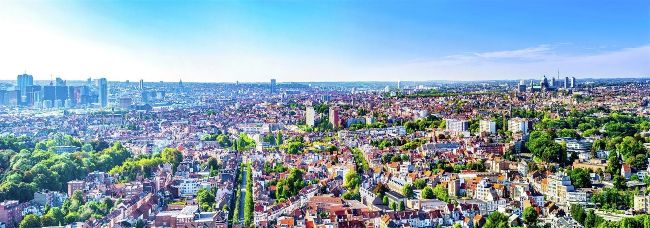No net land take policies, a recurring metropolitan affair?
Henk Bouwman, secretary general of METREX
Europe is on the way to elections in June. The new parliament will need to form a view on the events that are rapidly changing the European and global landscape: war and conflicts, elections in the United States, climate change, immigration and more. The outcome of the European elections will, as usual, bring new spatial policy approaches, but how does the very slowly changing practice of land use planning answer to that - Are there innovative ways to translate new policies into practical planning instruments?
Europe's metropolitan regions and areas, and their urban and rural communities, are inventing every day. The issues they face on a daily basis demand continuous innovation in which integrated thinking is key. Adaptation to climate change, for example, is typically a field where everything is interconnected. And, in my view, we understand less than half of what is happening when various climate phenomena come together and react.
Metropolitan regions and areas are often derived from the understanding of a need for regional comprehensive spatial planning, which is typically where activities such as housing, transport and workplaces should come together in an integrated, balanced land use plan for the wider region. But, over the last few decades, METREX - which I lead - has witnessed this spatial planning process becoming increasingly more complex. It must now take into account all the physical, sometimes invisible, environmental effects of our decisions in both the short and long terms.
To address climate adaptation in spatial planning, cities around the world are increasingly adopting sustainable urban development practices, including policies to limit urban sprawl and protect green spaces. Cities such as Amsterdam, Lyon and Paris, known for their commitment to sustainability and environmental consciousness, have implemented or are on their way to implementing policies known as no net land take policies.

Brussels, Belgium
The no net land take concept generally refers to policies or initiatives aiming to prevent the conversion of additional land for development, with the goal of minimising any impact on natural habitats and ecosystems. When one sees maps of the Netherlands over the last few decades, the land taken for urban extension has been enormous: a vast sea of low-density housing around cities, affecting ecosystems, but also pushing out farmland that could help feed cities locally.
Across Europe, we see a variety of reasons for designing no net land take policies. By addressing these factors, these policies can contribute to creating more sustainable and resilient urban and rural environments. Roughly, the policies aim to conserve natural habitats and preserve natural landscapes and certain agricultural ones, to avoid further urban sprawl, to promote brownfield redevelopment and to support measures for climate adaptation.
The no net land take concept generally refers to policies or initiatives aiming to prevent the conversion of additional land for development, with the goal of minimising any impact on natural habitats and ecosystems.
When we add the many other themes that a land use plan must address, one can see the complexity and can understand the lengthy processes involved in producing and deciding on these plans. This does not always appeal to the politics of here and now.
One of the positive side effects of implementing no net land take policies is that it pauses the process of further urban expansion, providing more time to develop and exchange solutions to come back with a better one. METREX strongly believes that this only makes sense on a metropolitan scale, where the effects of policies can be seen in a wider context. Although we feel the pressure "to get on with it", we also see the uncertainty regarding policy effects and therefore the vulnerability in the difficult and polarised political landscape.
One of the positive side effects of implementing no net land take policies is that it pauses the process of further urban expansion, providing more time to develop and exchange solutions to come back with a better one.
A more far-reaching approach, typical of land use planning, could be inspired by England. It is an interesting example to look at, as we seem to have forgotten about the green belt approach. In the Financial Times on 26 January 2024, Joshua Oliver highlighted one of the important things we can learn from the English case: adding "natural value to land" seems to work best when we also understand it is important to not take that land for urban or agro-industrial use. But, rightly, the article also shows the difficulties in keeping land open when it has little value, that is, when it is waste land without any natural value. I suggest enriching the thinking of no net land take with adding explicit value to the land that is not to be taken, and therefore really showing what this added value can bring to the wider regional area. Otherwise, a well-meaning policy may result in further urban sprawl outside the policy area, something we see in the aforementioned cities and regions.
Above all, we are optimistic about the ability of metropolitan areas to design regional policies and alliances with the surrounding (sub)rural areas. However, research and capacity building are urgently needed from a wide array of specialists. And for this, we have excellent experience with the ESPON targeted analysis programmes and we call upon you to join us in one around this topic.
Henk Bouwman is secretary general of METREX, a network of over 50 European metropolitan regions and areas.